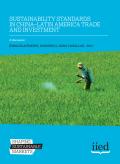This working paper is the joint effort of the Employment Intensive Investment Programme and the Green Jobs Programme. It explores the implications of climate change, its impacts on the world of work and the need for the work of the International Labour Office to adapt to it. It takes stock of the on-going work and identifies the needs for further development.
The Canadian Institute for Environmental Law and Policy (CIELAP) has conducted the following national research study to seek the perspectives of diverse Canadian stakeholders on what a Green Economy could mean for Canada in the lead-up to Rio+20. The study covers potential gains for Canada, success stories and best practices, lessons learnt, challenges and opportunities, as well as the role for the Canadian government and other stakeholders in advancing a green economy.
Trade has the potential to drive a green economy by fostering the exchange of environmentally friendly goods and services, increasing resource efficiency, generating economic opportunities and employment, and contributing to poverty eradication. If managed poorly, however, unrestrained trade can contribute to environmental degradation, unsustainable resource use, and increased wealth disparities, all of which hinder a green economy transition and sustainable development objectives.
This is the third edition of Dual Citizen’s annual Global Green Economy Index (GGEI), an analytic tool designed to help governments, international organizations and investors improve their “green” branding and communications strategies. This report provides an overview of the 2012 analysis of the GGEI. The GGEI measures perceptions of green reputations of 27 selected countries as judged by hundreds of expert practitioners and benchmarks these against a green economy performance index. These 27 countries represent over 90 per cent of the international green economy.

For governments, having a clear assessment of resource constraints and ecological risks they face, as well as a sound understanding of sectors of their economies that offer the largest potential for green growth, employment creation and efficiency gains, while securing public support, are critical to orient public policy. UNEP’s green economy advisory services are geared towards providing tailored support to countries for them to take appropriate responses.
The future of renewable energy is fundamentally a choice, not a foregone conclusion given technology and economic trends, according to this report. It examines the future of renewable energy in the context of: total energy share by sector; integration between utilities, buildings, industry and transportation; business models and investment; urban planning; national and regional policy; and technology, cost and market growth. The report is based on the opinions of 170 leading experts and the projections of 50 recently published scenarios. It finds a wide range of expert projections of the share of renewable energy in the global energy mix by 2050, with low estimates below 20 per cent to high estimates upwards of 50-95 per cent. Experts predicted that the expansion of renewable will accelerate through 2020, particularly in leading developing countries such as Argentina, Chile, Colombia, Egypt, Ghana, Indonesia, Jordan, Kenya, Mexico, Nigeria, the Philippines, South Africa and Thailand.
This report includes case studies on market growth and policy support for the European Union, the United States, Japan, China and India.
Albania’s energy consumption per capita and its CO2 emissions per capita are low, but due to outdated technologies in many sectors energy intensity is still high. Concerning energy supply, the share of renewable energy sources has contributed about 18–22 per cent of the primary energy balance, but the main role has been played by oil products, electricity, fuel woods and LPG.
Although Albania has a relatively comprehensive legislative framework governing energy politics and climate change comprising a wide range of topics, it still lacks legislation in some areas (energy conservation, renewable energy). The most important document for green growth is the (updated) National Energy Strategy. The Ministry of Environment, Forests and Water Administration (MoEFWA), is the government body responsible for environmental issues and policy.
The long-term vision of the High-Level Panel on Global Sustainability is to eradicate poverty, reduce inequality and make growth inclusive, and production and consumption more sustainable, while combating climate change and respecting a range of other planetary boundaries. This report makes a range of recommendations to take forward the Panel’s vision for a sustainable planet, a just society and a growing economy by concentrating on empowerment, strengthening institutional governance and working towards a sustainable economy.
This summary was prepared by Eldis.

